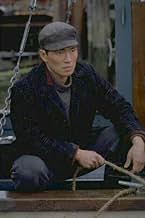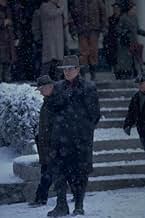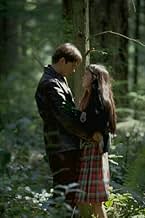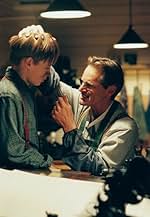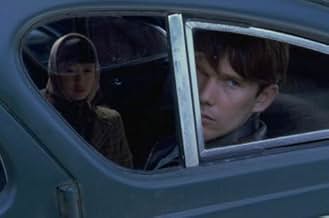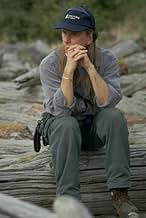AVALIAÇÃO DA IMDb
6,7/10
15 mil
SUA AVALIAÇÃO
Adicionar um enredo no seu idiomaA Japanese-American fisherman is accused of killing his neighbor at sea. In the 1950s, race figures into the trial. So does reporter Ishmael.A Japanese-American fisherman is accused of killing his neighbor at sea. In the 1950s, race figures into the trial. So does reporter Ishmael.A Japanese-American fisherman is accused of killing his neighbor at sea. In the 1950s, race figures into the trial. So does reporter Ishmael.
- Direção
- Roteiristas
- Artistas
- Indicado a 1 Oscar
- 5 vitórias e 11 indicações no total
Max von Sydow
- Nels Gudmundsson
- (as Max Von Sydow)
Yûki Kudô
- Hatsue Miyamoto
- (as Youki Kudoh)
Daniel von Bargen
- Carl Heine Sr.
- (as Daniel Von Bargen)
- Direção
- Roteiristas
- Elenco e equipe completos
- Produção, bilheteria e muito mais no IMDbPro
Avaliações em destaque
`Snow Falling on Cedars' stands as one of the most visually ravishing films of the past several years. Beautifully attuned to the natural splendor of its Washington State locale, the film actually converts its setting into one of the major characters in the film. Nature, in the form of topography, flora and weather, seems to exert, if only subliminally, as much influence on the people involved as their own actions and passions. However, there is always a drawback to a movie being so closely tied to its physical environment: very often the background advances to the foreground, ultimately overwhelming and dwarfing the human figures that should be our primary focus. Almost inevitably then, `Cedars' itself falls victim to this syndrome from time to time. Despite many intriguing elements in its narrative, we do come away remembering far more the stunning landscapes of rugged stone mountains, fog-enshrouded lakes and endless rows of snow-covered cedars than the characters at the story's core. Still, the film offers enough interest in the story and personalities to keep `Snow Falling on Cedars' relatively intriguing for the majority of its (admittedly overlong) 128-minute running time.
Set in 1950, the film chronicles the effect a mysterious death of a local fisherman has on the populous of a small island community made up mostly of whites and Japanese Americans, a death that, for complicated reasons, awakens many of the racial prejudices still holding over from the recently concluded war. As a Japanese man stands trial for the `murder,' Ishmael Chambers (Ethan Hawke), a mediocre reporter for the local paper, copes with three basic issues: his unrequited love for the defendant's Japanese wife, the flaring-up of anti-Japanese bigotry in both the past and the present, and haunting memories of his deceased father, a socially crusading newspaper publisher, in whose shadow Ishmael toils and against whose professional reputation Ishmael is tested and found wanting.
The film is definitely at its most emotionally powerful in its superb middle section, which beautifully dramatizes, in flashback, the shameful deportation of these Japanese-American citizens to interment camps in California, for no crime more serious than simply being of Japanese descent. Parallels to the rounding up of Jews in Nazi Germany are never far from our minds as we witness this wholesale forced migration of a group of innocent people singled-out to assuage the prejudice and fear of an ignorant but powerful majority. For these scenes alone, the film is most assuredly worth seeing.
Unfortunately, the rest of the film cannot sustain this same intensity of deep emotional conviction. The forbidden interracial childhood romance between Ishmael and Hatsue, the current wife of the man on trial, smacks a bit too much of tired Romeo and Juliet melodramatics. Furthermore, Ishmael seems underdeveloped as a character, too dreamy-eyed and passive, just the kind of character that can be easily swallowed up in a film in which the background plays such a prominent part. Moreover, the easy wrap-up of the trial is woefully unconvincing and unsatisfying both as realism and as drama.
On the positive side, `Snow Falling on Cedars' boasts a fascinating dual-level structure, in which small snippets of information are introduced to us in the form of near-subliminal quick cuts representing memories or speculations on past events, often, oddly, those at which none of the characters involved in the current scene were even present. This latter inconsistency in the film's point-of-view may seem dubious and questionable from a strictly narrative standpoint, but the format does help to flesh out the story and characters in interesting and intriguing ways, intensifying the mystery as we attempt to piece it all together to finally get a view of the whole picture. Director Scott Hicks, along with his co-writer Ron Bass, succeeds in providing a richly detailed glimpse into a shameful episode in American history - and the lyrical quality achieved through Robert Richardson's outstanding cinematography helps the film override some of its more obvious flaws. If one brings an attitude of patience and a fine eye for natural beauty to the film, `Snow Falling on Cedars' turns out to be quite rewarding, especially for those misguided misfits who still, at this late date, justify and defend the actions taken against the American Japanese during the war. This film is a stunning rebuttal to both them and their idiotic notions. For that aspect alone, `Snow Falling on Cedars' demands to be seen.
Set in 1950, the film chronicles the effect a mysterious death of a local fisherman has on the populous of a small island community made up mostly of whites and Japanese Americans, a death that, for complicated reasons, awakens many of the racial prejudices still holding over from the recently concluded war. As a Japanese man stands trial for the `murder,' Ishmael Chambers (Ethan Hawke), a mediocre reporter for the local paper, copes with three basic issues: his unrequited love for the defendant's Japanese wife, the flaring-up of anti-Japanese bigotry in both the past and the present, and haunting memories of his deceased father, a socially crusading newspaper publisher, in whose shadow Ishmael toils and against whose professional reputation Ishmael is tested and found wanting.
The film is definitely at its most emotionally powerful in its superb middle section, which beautifully dramatizes, in flashback, the shameful deportation of these Japanese-American citizens to interment camps in California, for no crime more serious than simply being of Japanese descent. Parallels to the rounding up of Jews in Nazi Germany are never far from our minds as we witness this wholesale forced migration of a group of innocent people singled-out to assuage the prejudice and fear of an ignorant but powerful majority. For these scenes alone, the film is most assuredly worth seeing.
Unfortunately, the rest of the film cannot sustain this same intensity of deep emotional conviction. The forbidden interracial childhood romance between Ishmael and Hatsue, the current wife of the man on trial, smacks a bit too much of tired Romeo and Juliet melodramatics. Furthermore, Ishmael seems underdeveloped as a character, too dreamy-eyed and passive, just the kind of character that can be easily swallowed up in a film in which the background plays such a prominent part. Moreover, the easy wrap-up of the trial is woefully unconvincing and unsatisfying both as realism and as drama.
On the positive side, `Snow Falling on Cedars' boasts a fascinating dual-level structure, in which small snippets of information are introduced to us in the form of near-subliminal quick cuts representing memories or speculations on past events, often, oddly, those at which none of the characters involved in the current scene were even present. This latter inconsistency in the film's point-of-view may seem dubious and questionable from a strictly narrative standpoint, but the format does help to flesh out the story and characters in interesting and intriguing ways, intensifying the mystery as we attempt to piece it all together to finally get a view of the whole picture. Director Scott Hicks, along with his co-writer Ron Bass, succeeds in providing a richly detailed glimpse into a shameful episode in American history - and the lyrical quality achieved through Robert Richardson's outstanding cinematography helps the film override some of its more obvious flaws. If one brings an attitude of patience and a fine eye for natural beauty to the film, `Snow Falling on Cedars' turns out to be quite rewarding, especially for those misguided misfits who still, at this late date, justify and defend the actions taken against the American Japanese during the war. This film is a stunning rebuttal to both them and their idiotic notions. For that aspect alone, `Snow Falling on Cedars' demands to be seen.
This is one of those films that needs to be seen a second time to pick up on the subtleties of the plot. It is a feast for the eyes and features outstanding acting. It also has a sense of balance. It doesn't manipulate its viewer. The murder mystery isn't one that brings in forces that threaten the main character. The forces are prejudice and fear. The adversaries are not people carrying guns but rather the legal system that often overlooked the rights of people of another race or ethnic background. The internment camps are part of the backdrop. I know that people say this is slow, but so is the process these people faced.
I loved the intellectual character of the young man who has to look past his own feeling and try to bring closure to someone he will never be able to have. The transitions are so breathtaking. The winter scenes are a portrait of softness and violence. My wife had read the book upon which this is based and said that the movie might be interesting. Apparently, the producers were unwilling to go the extra mile to get this noticed. It's a gem and deserves to be on a list of very fine movies.
I loved the intellectual character of the young man who has to look past his own feeling and try to bring closure to someone he will never be able to have. The transitions are so breathtaking. The winter scenes are a portrait of softness and violence. My wife had read the book upon which this is based and said that the movie might be interesting. Apparently, the producers were unwilling to go the extra mile to get this noticed. It's a gem and deserves to be on a list of very fine movies.
I loved the book, but I am not sure that any director could make the translation to film that captures both the lyrical and compelling nature of the book.
Scott Hicks goes for lyrical and he certainly delivers. The cinematography is beautiful, the pace reverberates in space and time. The characters are painted with pointillist precision.
The difficulty is that pointillism is pretty but lacks resolution. There is insufficient time to develop the characters. The urgent and desperate nature of the defendant's plight is lost amongst the beautiful cedars.
Still, if you enjoyed the book then I would recommend seeing this movie.
Scott Hicks goes for lyrical and he certainly delivers. The cinematography is beautiful, the pace reverberates in space and time. The characters are painted with pointillist precision.
The difficulty is that pointillism is pretty but lacks resolution. There is insufficient time to develop the characters. The urgent and desperate nature of the defendant's plight is lost amongst the beautiful cedars.
Still, if you enjoyed the book then I would recommend seeing this movie.
This film stands apart from the standard, sometimes clever, seldom memorable work that passes too often for Oscar fare nowadays. It is a film about life and death, love and betrayal, passion and pain, forgiveness and redemption. It is about the power of emotion to influence perception and memory. It is about justice and truth.
But that is not why you should see it; You should see it for the story. For this film is so finely crafted, and the story unfolds so naturally, that it is easy to appreciate for the simple compelling drama of the narrative. You care about the characters, you care about how the trial turns out, and you ache to know the truth.
The plot centers around a murder trial of a Japanese man charged in the death of a local fisherman, and on a white reporter covering the trial. It turns out the reporter had once been in love with a Japanese woman, now the accused man's wife. This romance was shattered as World War II broke out, and the young woman and her family were rounded up with other Japanese Americans, and interred in camps.
The story that unfolds is part "Casablanca", part "Amistad", part "To Kill a Mockingbird", yet wholly original and true to itself. It is at once a tender love story, a lesson in history, a murder mystery, and more.
The story of each of the main characters is told through flashbacks that reveal how each of them has suffered because of the war and how each has to overcome this suffering. Many of the most compelling images of the film occur in these flashbacks. Like real lasting memories, they are moments of deep emotional significance, and include many images which you will carry in your own mind long after you have left the theater.
If you look for them you may also find some symbolic or allegorical images in the film (the boat's mast resembles a cross; the fish could also be seen as a Christian symbol of sacrifice), but these elements are not heavy handed or forced, they occur naturally as important elements of the story which is set in a small fishing village on the Northwestern coast of the US in the years surrounding World War II.
While I have seen many reviewers comment on how beautifully filmed and well acted this film is, I have seen a few who have somehow failed to appreciate the significance of the story. My only caution on this account is, take care that you are not so blinded by beauty, that you fail to notice love.
In short, I found this to be a brilliant, deep, uplifting engrossing, and highly satisfying film experience.
But that is not why you should see it; You should see it for the story. For this film is so finely crafted, and the story unfolds so naturally, that it is easy to appreciate for the simple compelling drama of the narrative. You care about the characters, you care about how the trial turns out, and you ache to know the truth.
The plot centers around a murder trial of a Japanese man charged in the death of a local fisherman, and on a white reporter covering the trial. It turns out the reporter had once been in love with a Japanese woman, now the accused man's wife. This romance was shattered as World War II broke out, and the young woman and her family were rounded up with other Japanese Americans, and interred in camps.
The story that unfolds is part "Casablanca", part "Amistad", part "To Kill a Mockingbird", yet wholly original and true to itself. It is at once a tender love story, a lesson in history, a murder mystery, and more.
The story of each of the main characters is told through flashbacks that reveal how each of them has suffered because of the war and how each has to overcome this suffering. Many of the most compelling images of the film occur in these flashbacks. Like real lasting memories, they are moments of deep emotional significance, and include many images which you will carry in your own mind long after you have left the theater.
If you look for them you may also find some symbolic or allegorical images in the film (the boat's mast resembles a cross; the fish could also be seen as a Christian symbol of sacrifice), but these elements are not heavy handed or forced, they occur naturally as important elements of the story which is set in a small fishing village on the Northwestern coast of the US in the years surrounding World War II.
While I have seen many reviewers comment on how beautifully filmed and well acted this film is, I have seen a few who have somehow failed to appreciate the significance of the story. My only caution on this account is, take care that you are not so blinded by beauty, that you fail to notice love.
In short, I found this to be a brilliant, deep, uplifting engrossing, and highly satisfying film experience.
10jhclues
Honor and justice, the effects of prejudice, and most importantly the need for truth; all elements that bind us together as a community of Man, or threaten to tear us apart, depending upon the circumstances at hand, and how we, as a society approach them. What it all comes down to is having and living by a moral code, and applying that code objectively, especially in troubled times. And the real question is, when the time comes, are we as a people capable of achieving that objectivity that is imperative in assuring true justice for all? It's an important, legitimate question posed by director Scott Hicks in `Snow Falling On Cedars,' a very real and personal drama, that in the final analysis has a bearing of monumental proportions that ultimately defines who we are and what we are made of, while ascertaining whether or not we do, indeed, have the moral courage necessary to survive as a civilized species.
It's a small town in the State of Washington; the ninth anniversary of the attack on Pearl Harbor is coming up, and a young man named Kazuo Miyamoto (Rick Yune), a much decorated American soldier during the war, is on trial for the murder of local fisherman Carl Heine (Eric Thal). Covering the trial is reporter Ishmael Chambers (Ethan Hawke), whose father, Arthur (Sam Shepard), had been a respected newspaperman locally for many years, known as a man who was not afraid to speak from his conscience when writing an editorial, and who took a stand for the Japanese locals during the emotionally exasperating years encompassing World War II.
Attempting to objectively cover Kazuo's trial, Ishmael finds himself troubled by a conflict of interests; he has a history with Kazuo's wife, Hatsue (Youki Kudoh), a former relationship reaching back to their childhood, but which ended with the onset of the war. And Ishmael still is grappling with the bitterness he has felt since that time, born of his experiences in the military, as well as Hatsue's rejection of him. And now he is forced to objectively observe this pivotal point in her life, watching from the sidelines and seeing first hand the effects of the prejudice that is very much alive among the local citizenry, and which threatens the assurance of an impartial judgment in Kazuo's case; a judgment that will determine the future of not only Kazuo, but of Hatsue, the woman Ishmael once loved-- and still does.
Working from an intelligent screenplay (by Hicks and Ronald Bass, adapted from the novel by David Guterson), with this film Hicks demonstrates the difference between a visionary filmmaker and someone who just makes movies. In another's hands, because of the story itself, this would have no doubt been an excellent film; with Hicks directing, however, it becomes something much more, as he has taken it beyond excellent, crafting and delivering a film that is thoroughly mesmerizing, majestic and memorable. It's an accomplishment achieved through a visionary presentation, born of the director's sensitive approach to the material and his acute insights into the human condition. Fully utilizing all of the magic at his disposal, Hicks has taken a good film and turned it into an emotionally involving, inspirational and visually poetic experience.
With a haunting score by James Newton Howard underscoring the magnificent cinematography of Robert Richardson, Hicks brings the era and the rural splendor of Washington State vividly to life, creating an aesthetic ambiance that makes the emotional essence of the drama almost tangible; and by exacting some incredible performances from his actors, he sustains that emotional level and combines all of these elements to make this film riveting and unforgettable.
As Ishmael, Ethan Hawke gives a reserved, understated performance, through which he genuinely captures the essence of his character. Watching him, you can sense the turmoil of a soul at cross purposes with itself, and he enables you to sample that taste of bitterness toward life he so desperately needs to overcome if he is to move on within himself to greener pastures. With this role, Hawke was given the opportunity to do something fine, and he succeeds with one of his most memorable performances yet.
Youki Kudoh turns in an extremely affecting performance, as well, as Hatsue. With this moving portrayal of a young woman enduring unbearable inner turmoil, she fulfills the artistic promises made in previous films, such as `Mystery Train' in '89, and `Picture Bride,' in 1965. She's a terrific actor, whose eyes are truly a window to her soul.
Also adding to the success of this film are the supporting efforts of Richard Jenkins, as Sheriff Moran, and James Rebhorn as prosecutor Alvin Hooks. But the most notable performance of all comes from Max von Sydow, who as Kazuo's defense attorney, Nels Gudmundsson, is given an opportunity to return to the kind of role that shaped his career early on under the auspices of Ingmar Bergman. As Nels, von Sydow gives a performance made all the more powerful by the restraint and subtlety of his delivery. He takes what to most actors would be a good part, and makes it a cohesive element of the film. It's a performance that by all rights should have earned von Sydow an Oscar nomination, but sadly did not.
The supporting cast includes Reeve Carney (Young Ishmael), Ann Suzuki (Young Hatsue), James Cromwell (Judge Fielding), Ariia Bareikis (Susan Marie), Celia Weston (Etta) and Daniel von Bargen (Carl). In a year (1999) that saw lesser efforts acknowledged, `Snow Falling On Cedars' was inexplicably ignored at Oscar time (except for Richardson's most deserving nomination for cinematography); an injustice, to say the least, as this was clearly one of the best films of the year. Reminiscent of Ang Lee's artistry, yet with a style uniquely his own, Hicks has given us a poetic film of rare beauty and conscience, for which he is hereby granted an Award in it's purest form:
The gratitude of an appreciate audience. 10/10.
It's a small town in the State of Washington; the ninth anniversary of the attack on Pearl Harbor is coming up, and a young man named Kazuo Miyamoto (Rick Yune), a much decorated American soldier during the war, is on trial for the murder of local fisherman Carl Heine (Eric Thal). Covering the trial is reporter Ishmael Chambers (Ethan Hawke), whose father, Arthur (Sam Shepard), had been a respected newspaperman locally for many years, known as a man who was not afraid to speak from his conscience when writing an editorial, and who took a stand for the Japanese locals during the emotionally exasperating years encompassing World War II.
Attempting to objectively cover Kazuo's trial, Ishmael finds himself troubled by a conflict of interests; he has a history with Kazuo's wife, Hatsue (Youki Kudoh), a former relationship reaching back to their childhood, but which ended with the onset of the war. And Ishmael still is grappling with the bitterness he has felt since that time, born of his experiences in the military, as well as Hatsue's rejection of him. And now he is forced to objectively observe this pivotal point in her life, watching from the sidelines and seeing first hand the effects of the prejudice that is very much alive among the local citizenry, and which threatens the assurance of an impartial judgment in Kazuo's case; a judgment that will determine the future of not only Kazuo, but of Hatsue, the woman Ishmael once loved-- and still does.
Working from an intelligent screenplay (by Hicks and Ronald Bass, adapted from the novel by David Guterson), with this film Hicks demonstrates the difference between a visionary filmmaker and someone who just makes movies. In another's hands, because of the story itself, this would have no doubt been an excellent film; with Hicks directing, however, it becomes something much more, as he has taken it beyond excellent, crafting and delivering a film that is thoroughly mesmerizing, majestic and memorable. It's an accomplishment achieved through a visionary presentation, born of the director's sensitive approach to the material and his acute insights into the human condition. Fully utilizing all of the magic at his disposal, Hicks has taken a good film and turned it into an emotionally involving, inspirational and visually poetic experience.
With a haunting score by James Newton Howard underscoring the magnificent cinematography of Robert Richardson, Hicks brings the era and the rural splendor of Washington State vividly to life, creating an aesthetic ambiance that makes the emotional essence of the drama almost tangible; and by exacting some incredible performances from his actors, he sustains that emotional level and combines all of these elements to make this film riveting and unforgettable.
As Ishmael, Ethan Hawke gives a reserved, understated performance, through which he genuinely captures the essence of his character. Watching him, you can sense the turmoil of a soul at cross purposes with itself, and he enables you to sample that taste of bitterness toward life he so desperately needs to overcome if he is to move on within himself to greener pastures. With this role, Hawke was given the opportunity to do something fine, and he succeeds with one of his most memorable performances yet.
Youki Kudoh turns in an extremely affecting performance, as well, as Hatsue. With this moving portrayal of a young woman enduring unbearable inner turmoil, she fulfills the artistic promises made in previous films, such as `Mystery Train' in '89, and `Picture Bride,' in 1965. She's a terrific actor, whose eyes are truly a window to her soul.
Also adding to the success of this film are the supporting efforts of Richard Jenkins, as Sheriff Moran, and James Rebhorn as prosecutor Alvin Hooks. But the most notable performance of all comes from Max von Sydow, who as Kazuo's defense attorney, Nels Gudmundsson, is given an opportunity to return to the kind of role that shaped his career early on under the auspices of Ingmar Bergman. As Nels, von Sydow gives a performance made all the more powerful by the restraint and subtlety of his delivery. He takes what to most actors would be a good part, and makes it a cohesive element of the film. It's a performance that by all rights should have earned von Sydow an Oscar nomination, but sadly did not.
The supporting cast includes Reeve Carney (Young Ishmael), Ann Suzuki (Young Hatsue), James Cromwell (Judge Fielding), Ariia Bareikis (Susan Marie), Celia Weston (Etta) and Daniel von Bargen (Carl). In a year (1999) that saw lesser efforts acknowledged, `Snow Falling On Cedars' was inexplicably ignored at Oscar time (except for Richardson's most deserving nomination for cinematography); an injustice, to say the least, as this was clearly one of the best films of the year. Reminiscent of Ang Lee's artistry, yet with a style uniquely his own, Hicks has given us a poetic film of rare beauty and conscience, for which he is hereby granted an Award in it's purest form:
The gratitude of an appreciate audience. 10/10.
Você sabia?
- CuriosidadesWhen the Japanese-Americans are sent to internment camps, many of the extras were Japanese-Americans who had actually been sent to the camps in the 1940s.
- Erros de gravaçãoJapanese guests wear black ties at the wedding. They should be wearing white ties. In Japan, black ties are for funerals.
- Citações
Nels Gudmundsson: It takes a rare thing, a turning point, to free oneself from any obsession. Be it prejudice or hate, or, even love.
- Cenas durante ou pós-créditosJan Rubes and Sheila Moore are on the credits despite their scenes being deleted.
- ConexõesFeatured in Siskel & Ebert & the Movies: Double Jeopardy/Jakob the Liar/Mumford (1999)
- Trilhas sonorasMoon over Burma
Written by Friedrich Hollaender (as Frederick Hollander), Frank Loesser
Performed by Dorothy Lamour
Courtesy of the RCA Records Label of BMG Entertainment
Principais escolhas
Faça login para avaliar e ver a lista de recomendações personalizadas
- How long is Snow Falling on Cedars?Fornecido pela Alexa
Detalhes
Bilheteria
- Orçamento
- US$ 35.000.000 (estimativa)
- Faturamento bruto nos EUA e Canadá
- US$ 14.417.593
- Fim de semana de estreia nos EUA e Canadá
- US$ 32.135
- 26 de dez. de 1999
- Faturamento bruto mundial
- US$ 23.049.593
- Tempo de duração2 horas 7 minutos
- Cor
- Mixagem de som
- Proporção
- 2.39 : 1
Contribua para esta página
Sugerir uma alteração ou adicionar conteúdo ausente

Principal brecha
By what name was Neve Sobre os Cedros (1999) officially released in India in English?
Responda

